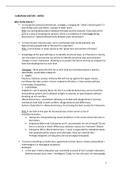Resume
European History Summary
- Établissement
- Vrije Universiteit Brussel (VUB)
I summarized the whole course of European History based on the lectures and the book, given at the VUB for students of Business Economics, Social sciences, Politieke Wetenschappen
[Montrer plus]




